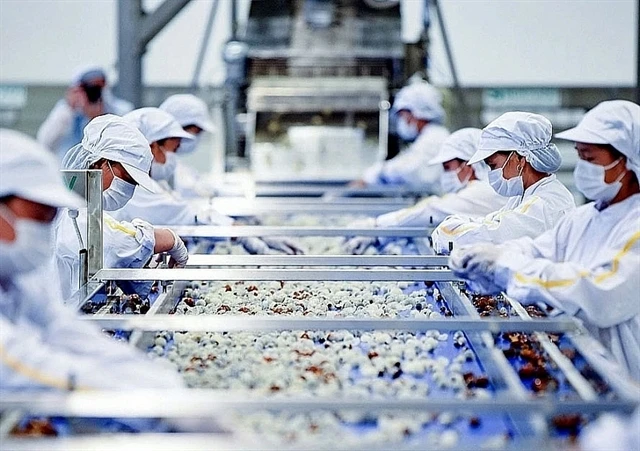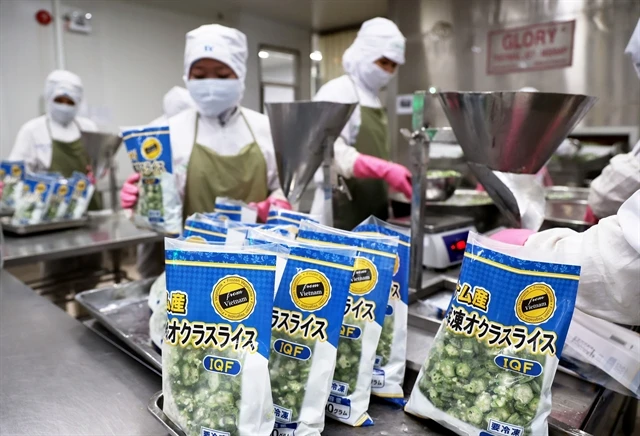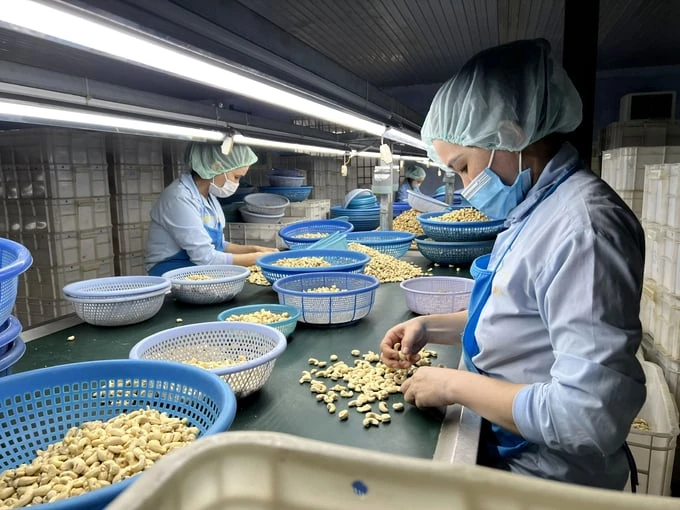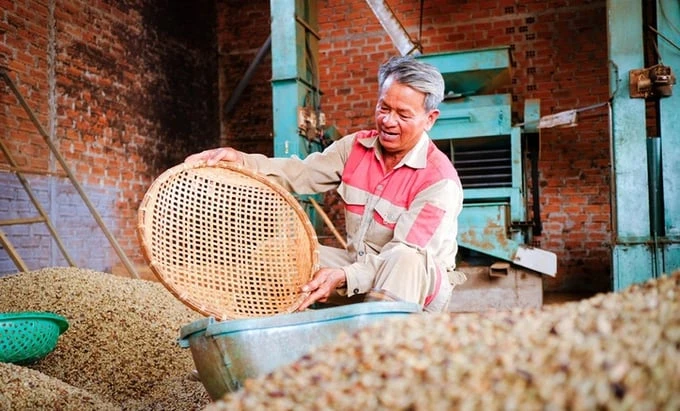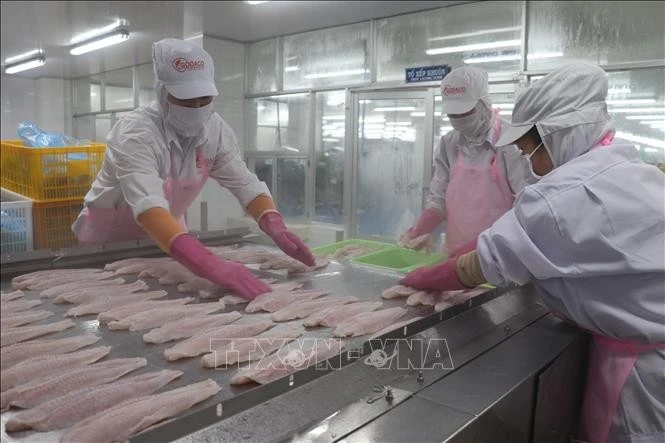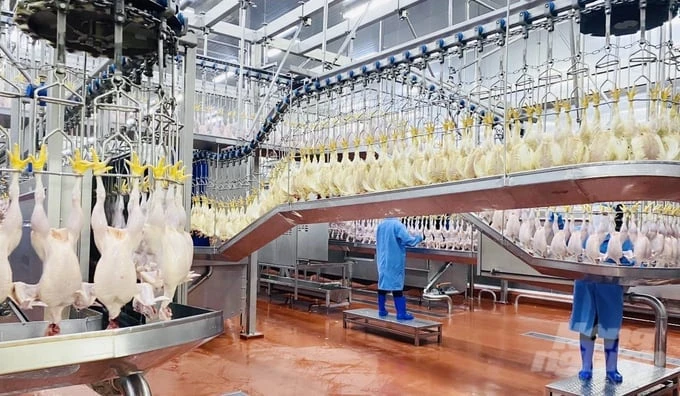
By Vietnam Expo On 01-07-2024 at 7:45 am
Agro-forestry-fishery exports in 6 months reach 29.2 billion USD, up 19%
In the first half of the year, despite numerous challenges both globally and domestically, the agricultural sector has strived to achieve impressive results.
Industry-wide trade surplus reach over 8 billion USD, an increase of over 62%
Speaking at the Press conference for the second quarter of 2024 on June 28, the Deputy Minister of Agriculture and Rural Development Phung Duc Tien commented: In the face of many difficulties and challenges, agriculture still affirms its important role, especially in ensuring domestic and international food security.
Despite the impact of drought and saltwater intrusion, crop productivity remained high in the first half of the year, ensuring sufficient output for export. Livestock farming, including cattle and poultry, developed relatively stably, and the weather was relatively favorable for both aquaculture and fisheries.
As a result, total export turnover of agro-forestry-fishery (AFF) products in the first six months of the year reached 29.2 billion USD, an increase of 19% compared to the same period in 2023. The total import turnover of agricultural, forestry, and fishery products was nearly 21 billion USD, resulting in a trade surplus of over 8 billion USD for the sector, an increase of more than 62%.
Contributing to these results are seven products and product groups with export values exceeding 1 billion USD: coffee, rubber, rice, vegetables, cashew nuts, shrimp, and wood products. Notably, rice and cashew nuts saw increases in both export volume and value.
In the first six months of the year, rice exports reached 4.68 million tons (up 10.4%), valued at 2.98 billion USD (up 32%). Cashew nut exports reached 350 thousand tons (up 24.9%), valued at 1.92 billion USD (up 17.4%). Although coffee export volume decreased (reaching 902 thousand tons, down 10.5%), the average export price increased by 50.4%, bringing the export value to 3.22 billion USD (up 34.6%).
The above results are due to the agricultural sector's focus on implementing projects to promote the export of AFF resources to key markets, which were approved at the end of 2023. These key markets include China, the United States, Japan, and the EU. Additionally, efforts have been made to open up new, promising markets such as Halal Muslim countries, the Middle East, and Africa.
As a result, the market for product consumption has been maintained and expanded, and renewable energy exports have continued to experience high growth momentum. The US, China, and Japan remain the three largest export markets for Vietnam's AFF products.
Export value to the United States accounted for 20.7% of the total, an increase of 20.8%; China accounted for 20.2%, an increase of 9.5%; and Japan accounted for 6.7%, an increase of 5%.
Strengthening prevention and control of African swine fever
One of the challenges currently facing the agricultural industry is African swine fever (ASF). According to Mr. Phan Quang Minh, Deputy Director of the Department of Animal Health, there are currently 21 provinces with outbreaks in the country, but they have been promptly controlled through eradication. Vietnam has registered two types of vaccines for circulation and has used 3.9 million doses of ASF vaccine to date. These vaccines, produced by Vietnamese enterprises, have also received high praise internationally.
Mr. Minh noted: "In all households with outbreaks, 100% of the pigs have not been vaccinated. The difficulty in vaccination lies in the lack of a specific policy to support farming households in vaccinating their pigs. It is predicted that in the coming months, if we do not implement vaccination measures rigorously, there is a risk of small outbreaks occurring."
In response to the urgent situation, vaccine manufacturing enterprises have recently expanded the use of the vaccine to cover a broader range of subjects. Specifically, the ASF vaccine, which was previously used for animals aged 8-10 weeks, can now be administered to animals aged 4 weeks and older.
According to a representative of the Department of Animal Health, the Ministry of Agriculture and Rural Development is continuing to complete procedures to submit to the Government for consideration and promulgation of a Decree on the support mechanism for African swine fever prevention. The Department will coordinate with specialized agencies of the Ministry of Justice to supplement and complete legal documents on policies to support disease prevention and control tools.
Addressing the issue of disease prevention and control in livestock farming, Deputy Minister Phung Duc Tien noted that the country currently has 385 centralized slaughterhouses, while the number of small slaughterhouses is up to 24,654. Currently, management agencies only control about 18.6% of small slaughterhouses in the area.
At the management level, leaders of the Ministry of Agriculture and Rural Development emphasized the need to promptly issue directives on slaughter control, veterinary hygiene, and food safety management of animal-origin products. This will address the difficulties in controlling slaughter activities in localities.
Additionally, measures will be organized and implemented to strictly control the trading and transportation of livestock, poultry, and related products, especially at border gates, trails, and openings in border areas.
Consistent with the goal of reaching 53 billion USD in AFF exports
The agricultural and rural sector is implementing the Work Plan for the first six months of 2024 in a context of mixed advantages and challenges, including market fluctuations, severe hot weather, drought in the Central Highlands and Central regions, and saltwater intrusion in the southern provinces.
In this context, the entire industry has proactively coordinated with ministries, branches, and localities to focus on implementing solutions to develop production and respond to market fluctuations, weather conditions, and epidemics. Efforts have also been made in trade promotion and market opening to boost agricultural product consumption.
To achieve the target of 53-54 billion USD in AFF exports in 2024, Deputy Minister Phung Duc Tien affirmed that the agricultural sector has specific solutions for each field, tailored to the climate situation and global fluctuations.
Regarding cultivation, the focus will be on directing the production of summer-autumn, autumn-winter, and seasonal rice crops in alignment with weather and market developments. There will be close monitoring of the production of industrial crops and fruit trees, especially key fruit trees such as dragon fruit, longan, durian, mango, and rambutan in the Mekong Delta, to provide appropriate crop guidance and increase the percentage of certified products.
To sustainably develop the fisheries industry, the Ministry will prepare to collaborate with the inspection team of the European Commission (EC). Efforts will be concentrated on directing and urging the implementation of Directive No. 32-CT/TW dated April 10, 2024, from the Secretariat, and the Government's Action Program and Plan No. 52/NQ-CP dated April 22, 2024, which focus on strengthening the prevention and combat of illegal, unreported, and unregulated (IUU) fishing.
Significantly, from August 1, 2024, the application of Resolution 04 by the Council of Judges of the Supreme People's Court on criminal prosecution for activities related to illegal fishing, trading, and transportation of seafood will serve as an important basis for Vietnam to continue its fight against illegal seafood exploitation.
During this period, there will also be a focus on developing and implementing legal documents, alongside promoting forestry and fishing port planning. "We hope that the strategies in livestock and fisheries will be effectively implemented, contributing to agriculture achieving its growth goals," the Deputy Minister stated.
To adapt to erratic weather conditions, irrigation and natural disaster prevention work will be prioritized. The Ministry will closely monitor developments in weather, water resources, and hydrometeorology to urgently implement solutions to prevent and combat drought, water shortages, and saltwater intrusion, thereby preventing water shortages that affect daily life and agricultural production.
Additionally, there will be strengthened inspection and urging of safety measures for key dyke and dam systems. Plans and scenarios will be prepared to respond to major floods, particularly large-scale floods and adverse weather conditions.
In the first six months of 2024, agriculture maintained a fairly high growth rate, reaffirming its role as a pillar of the economy. The productivity and output of many key products increased, ensuring the supply of food and essential goods, thus making an important contribution to the country's GDP growth.

Author
Vietnam Expo
Related posts

